With just two collections so far, Heavy Machine’s industrial-inspired shoes have caught the eyes of fashion insiders.
Sandals and pumps by the Taiwanese brand, which was launched in 2009, feature sculptural details like sharply angled resin heels and soaring platform soles. Feminine color combinations in jewel and sherbet tones offset the futuristic designs.
The brand has been written up in Ars Sutoria, a leading trade publication, US Glamour, Japan’s So-en, and appeared on influential fashion blogs Style Bubble (www.stylebubble.co.uk) and Kingdom of Style (www.kingdomofstyle.net).
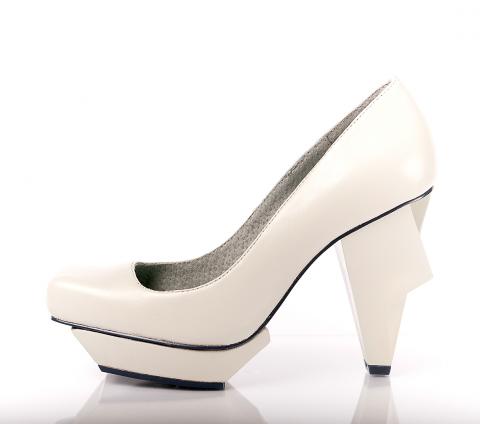
Photo courtesy of Heavy Machine
Heavy Machine designers Yoyo Pan (潘國瑤) and Michelle Wu (吳怡慧) met four years ago. Both studied fashion design abroad, Pan at the Royal Melbourne Institute of Technology and Wu at the Fashion Institute of Technology in New York City. From the beginning of their friendship, the two talked about launching a line of shoes different from what was then available on the market.
“We liked shoes that are unusual and hard to find,” Wu says. “We wanted them to be completely unlike any other shoes.”
At the beginning, the two had to tone down some of their more exaggerated designs in order to make them manufacturable.
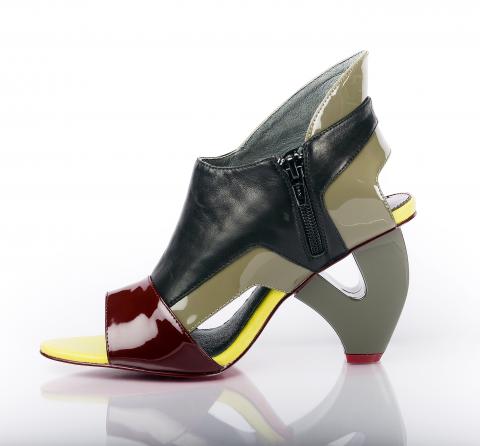
Photo courtesy of Heavy Machine
“The footwear makers said they couldn’t actually make it or else the shoes would turn out completely different from our sketches,” Wu says.
“At first we didn’t really understand the construction of shoes and just designed what we thought was cute,” Pan says. She enrolled at the Footwear and Recreation Technology Research Institute (台中鞋技中心) in Taichung, where she studied shoe engineering.
The duo look up to designers who are known for their conceptual creations, including Martin Margiela, Nicolas Ghesquiere and Helmut Lang, and their influence can be seen in Heavy Machine’s innovative designs.
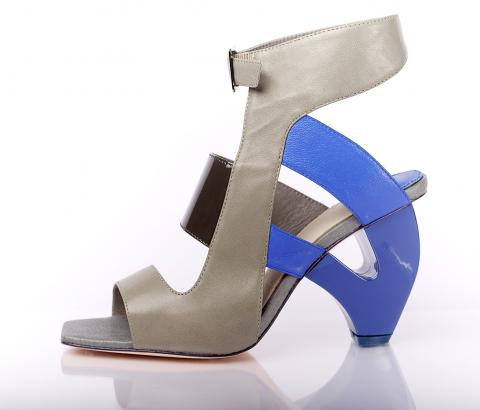
Photo courtesy of Heavy Machine
But Pan and Wu’s brand has also earned kudos for its wearability. In one post, blogger Susanna Lau of Style Bubble pronounced a pair of shoes from Heavy Machine’s first collection “definitely comfortable” after a day spent walking around in them.
High-heeled sandals and pumps are balanced with a curved platform sole to stabilize the foot while walking. Heels are placed to support the weight of the body.
“I’m not very good at wearing high-heeled shoes. I find a lot of them uncomfortable and hard to walk in,” Wu says. “I want to make shoes that I can at least wear myself.”
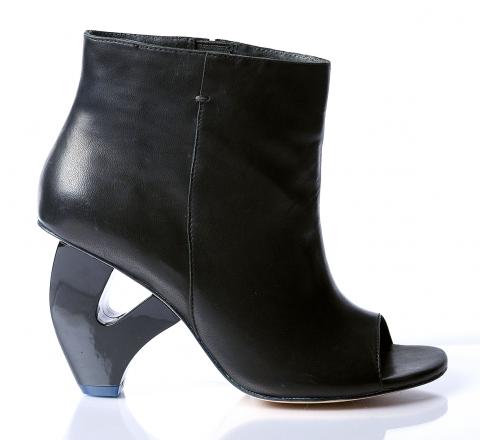
Photo courtesy of Heavy Machine
From the start, Pan and Wu pursued an international market for Heavy Machine, attending trade shows including Designers and Agents (D&A) in New York City and Tranoi in Paris. Their shoes are currently sold in 10 countries, including Taiwan, Kuwait, Australia, the Netherlands, Japan and Hong Kong.
“We don’t have a target customer in mind,” Wu says. “Just as long as they are women — or men.”
“Yes, as long as they are people,” Pan adds.
For a list of stores, visit www.heavymachinedesign.com

Google unveiled an artificial intelligence tool Wednesday that its scientists said would help unravel the mysteries of the human genome — and could one day lead to new treatments for diseases. The deep learning model AlphaGenome was hailed by outside researchers as a “breakthrough” that would let scientists study and even simulate the roots of difficult-to-treat genetic diseases. While the first complete map of the human genome in 2003 “gave us the book of life, reading it remained a challenge,” Pushmeet Kohli, vice president of research at Google DeepMind, told journalists. “We have the text,” he said, which is a sequence of

On a harsh winter afternoon last month, 2,000 protesters marched and chanted slogans such as “CCP out” and “Korea for Koreans” in Seoul’s popular Gangnam District. Participants — mostly students — wore caps printed with the Chinese characters for “exterminate communism” (滅共) and held banners reading “Heaven will destroy the Chinese Communist Party” (天滅中共). During the march, Park Jun-young, the leader of the protest organizer “Free University,” a conservative youth movement, who was on a hunger strike, collapsed after delivering a speech in sub-zero temperatures and was later hospitalized. Several protesters shaved their heads at the end of the demonstration. A

In August of 1949 American journalist Darrell Berrigan toured occupied Formosa and on Aug. 13 published “Should We Grab Formosa?” in the Saturday Evening Post. Berrigan, cataloguing the numerous horrors of corruption and looting the occupying Republic of China (ROC) was inflicting on the locals, advocated outright annexation of Taiwan by the US. He contended the islanders would welcome that. Berrigan also observed that the islanders were planning another revolt, and wrote of their “island nationalism.” The US position on Taiwan was well known there, and islanders, he said, had told him of US official statements that Taiwan had not
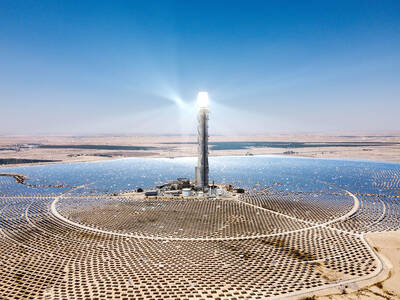
We have reached the point where, on any given day, it has become shocking if nothing shocking is happening in the news. This is especially true of Taiwan, which is in the crosshairs of the Chinese Communist Party (CCP), uniquely vulnerable to events happening in the US and Japan and where domestic politics has turned toxic and self-destructive. There are big forces at play far beyond our ability to control them. Feelings of helplessness are no joke and can lead to serious health issues. It should come as no surprise that a Strategic Market Research report is predicting a Compound